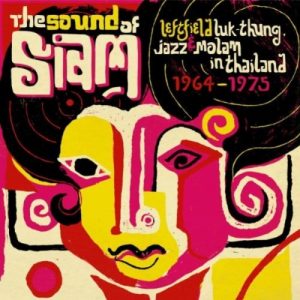Kultur, Was machen wir heute?
Retro-Pop aus Thailand: Chris Menist im Interview
- Retro-Pop aus Thailand: Chris Menist im Interview - 20. September 2011
- Thank you for rocking so hard! - 12. April 2011
- Brit Jazz Week – Soweto Kinch and the poetry of jazz - 21. März 2011
For those of you who have a passion for both the great unknown and Mother Asia (I mean, who doesn’t), there’s an upcoming party you wouldn’t want to miss in the Import/Export on Goethestrasse, and I’m here to make sure you won’t; so let me start by just telling you a few things about what you’ll hear and most probably dance to on Friday, September the 23rd.

Photo credits: David Procter
Chris Menist is a British DJ, writer, musical archeologist/anthropologist and musician, who’s also the mastermind (along with Thai DJ and friend Maft Sai) behind one of Soundway’s most popular records, The Sound Of Siam. If you’re familiar with Soundway, you might know that they specialize in rediscovering obscure sounds from all over the world and then prettily packaging them for our convenience. This compilation came out last year and it quickly gained popularity among critics and music enthusiasts, mostly because it really is something else.
In sound and spirit, even if it’s so incredibly diverse, Thai music is unique. The uniqueness must be coming from all the cultural influences Thailand has been exposed to throughout its short history, the political tumult it went through during the most part of the 20th century, as well as from the incredibly powerful imagination of its people(s). So Thailand’s music, which is immensely varied and contrasting in all 4 cultural regions of the country, can sound very alien to any Western pair of ears. I don’t know whether it’s the general enthusiasm of the Thai people or the wavy intonations in their voices, but this music, especially its rural forms like Luk Thung (songs of the field) or Molam (the meditative sounds of the North East) conjures a completely new spectrum of emotion to the non-experienced listener.
The Sound of Siam, as well as its sibling compilation, Thai? Dai! on Finders Keepers, are two examples of masterful, statement-free repackaging of some of the local sounds of the 60s and 70s. During the early sixties, Western music and fashion were finally reaching those pristine shores, so traditional Thai folk music suddenly started embracing this influence and produced a few very interesting hybrids. Free jazz, soul, surf guitars, thick basses, pulp movies, Moog synthesizers, psychedelic jangle, cha-cha-cha and even Bollywood songs, they’re all there, mercilessly mashed together in some of the nuttiest experiments you’ll probably ever listen to. This is most evident when you stumble upon unfamiliar sounds made by classical, analog Thai or Lao instruments, mixed in with electric guitars, basses and organs that essentially play the same melody.
18 of the 19 tracks on The Sound of Siam are vocal, so you will probably be delighted to discover each voice you hear and instinctively interpret it, as Chris himself would put it, as a new instrument. Thai is a phonetic language, so even the kitchen (clunks and) chatter you’ll find in the middle of “Kai Tom Yum†will most likely sound like wonderful onomatopoeia and will make perfect sense in the context. You will notice the tracks have been carefully selected not to resemble each other in rhythm and style, but that they do have something in common: a sort of an intimate friendliness, an artlessness and a genuine excitement which I think you can recognize on the faces of most of the Thai people you meet.
All in all, The Sound of Siam is a brilliant, esoteric, psychotronic record and if you still don’t believe me, here’s an interview with one of its compilers. It was initially meant to be a video interview, but you know how fussy Skype can be.
[soundcloud url=”http://soundcloud.com/soundway-records/chaweewan-dumnern-lam-tung-wai”]


I heard you just moved back to the UK. Are you planning on staying? And how come you left Bangkok?
Yes, I recently moved back to the UK so right now I’m sorting our house out, going through lots of piles of records, deciding where to put them, you know. I’m going to be here for at least twelve months and then we’ll see what happens. You know it’s mostly practical, dull reasons why I move around – I mean most places I’ve been to have been connected with work, and just to give you a little bit of background, we first moved to Bangkok because my wife is a teacher and my two kids were going to the same school she was working at. We’ve been away for just under 5 years, (3 and a half of which we spent in Bangkok) and we just wanted to come back to the UK for a bit, spend some time with family, see friends… also we wanted to expand this beyond the borders of Thailand, we wanted to see if the music has legs beyond its country of origin, so this will be part of that experiment, I suppose.
Did you get to learn any Thai during those 3 years? How about deciphering the liner notes, titles and artists on hundreds of records – was that a challenge?
Well, as you know the English are really terrible for learning other peoples’ languages.  I learned enough to get by, but I certainly wasn’t fluent, as Maft can testify. As for reading what’s written on most records, to be honest with you, even if I read Thai, I think I would have missed out on certain things. Maft obviously is Thai, so he could be a bit more selective with what he picked up, but I found certain things that he had passed over because he either didn’t know the artist or it didn’t sound very promising. When buying American or English records, there’s a certain amount of information you get from the design of the sleeve, the typeface of the title, the clothes people are wearing, the instruments they’re playing, what year was the album released, etcetera. For one reason or another, there’s none of that information available on most Thai records. So you can get a record that looks really promising, a band with sets of percussion and Moog synthesizers in the front, and you listen to it and it’s complete rubbish, it’s like terrible love ballads, with none of the instruments they seem to be playing on the sleeve featured on the record.
One of the songs you compiled is about a soup, another one about sticky rice and pickled fish, there’s a third that is a cover of an Italian softcore flick’s main music theme – have you ever thought about translating them for Western listeners? Do you think their translating would prove to be interesting?
Chris Menist on Thai lyrics from Blisiq Baku on Vimeo.
Chris Menist on Thai lyrics from Blisiq Baku on Vimeo.
How are the two compilations received in Thailand? Do young Thais buy the record?
I don’t know about the actual sales, but most of this music is available to them anyway. I did notice a change in attitude during the Paradise Bangkok nights though. Initially, people found it very strange for us to play these songs because of the social dynamic of Thailand. In Bangkok there’s all the industrial, economical wealth and the political strength – it’s a capital in every sense of the word. So a lot of this music is from the countryside – Luk Thung literally means “song of the fields†– and a lot of Bangkok Thais consider it unsophisticated. So at first most of them were like “What, you’re playing Luk Thung music, this is the kind of music my uncle listens to, why the hell would you play that in a club?†Which I did understand, I mean I don’t know what I’d think if a Thai DJ came to England and started playing The Everly Brothers.
So what’s so special about this music?
When Maft and myself first started doing this, or, judging from a musical perspective, when I first started buying the Luk Thung stuff, I heard different elements of other music in it. There were certain things that reminded me of African or Latin music, for example. During a club night, when one of these tracks came up in between other types of music, people seemed to be enjoying it, but we’ll never know for sure. The Bangkok club scene is very commercial, so what we were doing was obviously coming from a different perspective. Some of the young Thais who were coming there and they heard this “old music†were suddenly listening to it with a new set of ears, judging it from a different angle. I could say we were quite well received in Thailand and in other parts of Asia – we’ve been to Japan three times this year, for example. We did a couple of Paradise Nights there and we felt that both compilations got a good following, as well as many good reviews in the US and Europe, and that’s very encouraging. We did this project not to be exotic or clever, we just think this is good music, and it’s underrepresented and we think it should have a wider platform.
If you were to choose one of the tracks on any of the two compilations as your personal favorite, which one would it be?
Chris Menist on his favorite track from Blisiq Baku on Vimeo.
Chris Menist on his favorite track from Blisiq Baku on Vimeo.
Have you met any of the artists?
Yes, I actually met Waipod Phetsuphan a few months ago, which was great. There are not too many foreigners into this music so he seemed pleasantly surprised that this farang with the beard asked him to sign some LPs. And on the Last Paradise Bangkok before coming here we had Dao Bandon playing.
He’s a monk, right?
Well just to give you some context, Thailand is essentially a very rural society so the amenities are not that plentiful; many people went to join the temple not only for religious reasons but in order to learn how to read and write. So Dao Bandon did join as a monk’s apprentice, and he also formed his vocal style learning to sing the religious songs called Lae, (that’s also where he discovered his own abilities as a vocalist) but he left as an adult because he wanted to pursue music. But again, to have him play at one of our nights was a real thrill. It went down as good as we could have possibly hoped.
So what will you be playing in Munich?
We’ll be playing at Import/Export on Friday the 23rd and the night’s called Sound of Siam, same as the Soundway compilation. We’re going to be recreating as best as we can one of our Paradise Bangkok nights for the People of Munich, and hopefully they’ll be into it – they’ll certainly hear something very different, I can guarantee you that.






No Comments